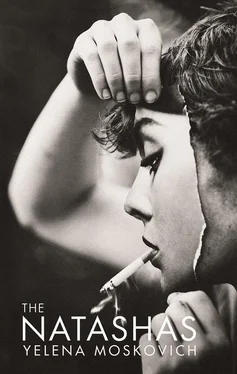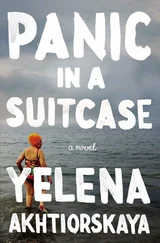9
Years later, after achieving a high-level university degree, Sabine had moved to Dresden, got a well-paying job at the automobile manufacturing company where she had authority and integrity, and finally a position where she was paid to boss people around and inform them of things they should know.
The thing that continued to bother her were the sightings. She could never be sure, but she had the impression that perhaps Karl was following her.
She first spotted someone who looked like Karl at a café near her apartment building. Then she swore she had spotted him again, behind a tree in the small park across the street from where she was having dinner by herself at a Turkish restaurant.
The years passed and she accumulated many sightings of Karl. She had changed the lock on her door a total of nine times in three years. But Karl, whether he was there or not, never came face to face with her. Maybe she had imagined him. Every time she called home, her mother and step-father each swore that they hadn’t seen or heard from Karl since the night he had left. Though her mother once told her in secret that she thought she had seen his face on TV during the riots in Leipzig. Then again, she couldn’t be sure. “Oh, honey, they all look the same with their arm stretched out into the air like a bunch of idiots. Your grandfather would turn in his grave if he knew. It was one thing for me to marry your father—”
“Which one?” Sabine cut off her mother.
“Oh, darling, don’t hate me, please don’t hate me.”
After a silence on the phone, Sabine pronounced in a childish voice, “I don’t care any more.”
After she hung up the phone, she remembered her grandpa telling her about his time in the concentration camp at Drancy, just outside of Paris, before he was deported, how some stole bread from children and others died for strangers. He had believed that heroism would be a greater force than organised cruelty. Perhaps his belief system was his saving grace, as he survived. At the end of his stories, however, his tone would drop as he said, “…Look around. What a world to survive for…”
Sabine went to the bathroom mirror and slapped herself hard in the face.
10
In her wheelchair now, on the canal with César, she expressed none of this. It passed unspoken beneath her rolling list of facts and figures of Dresden, automobiles, highways, and emperors. He waited patiently for the pauses to say “uh huh” and “oh” as if he were filling in mortar between bricks.
Then she closed her lips, as if for good. The sudden silence concerned César.
“S-s-so… you’ah… miss your family?”
Sabine turned to look at César. There was a flash in her eyes.
“Come on. We aren’t done with our walk.”
César got up, brushed the back of his jeans. He looked around him at the young people, drinking, smoking, snacking, belonging to their moments. He sighed and pulled the wheelchair around, back on to the cobblestone road.
11
“Here, right here, you missed it,” Sabine said.
César made a brisk U-turn with the wheelchair. He was getting the hang of this.
“Here?” he asked.
“Yes, here.”
The terrace of the bar was crowded with smokers and chatterers. César wheeled up, excused them, and tried to get in. People were annoyed by César’s attempt at entry, but as soon as they saw the woman in the wheelchair, they quickly smiled and scooted themselves in the most polite manner. Body by body, the crowd opened up and César inched Sabine toward the entrance.
Around the edge of the door, behind the sitting drinkers, were rows of standing ones, with their backs to César making an impenetrable comb-tooth wall. César reached over and tried to tap some people on the shoulder. One person turned, then another, then a small passageway was made and bodies shifted to the side like a curtain being drawn.
César placed his hands on the wheelchair handles and gave Sabine a soft slide forward. A light reflecting from the stage blinded him momentarily, then shifted over his head. In front of him, all the tables were full with people sitting, sipping their beers and wines and looking intently at the stage.
On the stage, a bearded man held a double bass and strummed. On the other side, a clean-shaven man played the piano. Behind them, a bald drummer held the rhythm steady. At the centre, in a long, black lace gown, the woman held a note with her eyes closed. Just as the note finished, she opened her eyes and looked at the crowd. Her hand let go of the microphone and swept over the lobe of her ear, then up over her tightly wound, blonde chignon.
1
The light from the terrace of the bar spilled into the quiet street, where it lit the fingers and mouths of the crowd. Across the road, a solemn stone church had its back to the lively bodies on the terrace. Young men chatted with young women with their hips crooked forward into their drinks. Young women asked for a light from their young women friends; some had the shadow of a shared childhood between them. The middle-aged were coupled, mainly to their present partner or to a silent vibration of their past one, a fretful wind in the fields within their eyes.
The chatter continued. A number of things were funny. A number of things were not. God was thanked every couple of minutes. Then an ex was brought up. Throughout, as if continuously lining the scene with glue so it wouldn’t break, were the Indian rose sellers. They made their way through the people holding wide bouquets of red and white roses. Person by person, a rose was offered.
(These rose sellers are unaffected by the phrase “No, thank you.” They find each person’s eyes, tilt forward their bouquet and, like a monk, chant their limitless belief in each individual’s need for a rose, just one, white or red, with or without the plastic, two euros… He’ll wait, he’ll wait a lifetime for the realisation to come: the rose and how you needed it.)
2
The domed roof of the church across the street seemed to watch over the bar with an ancient grin. Inside, down the cold corridor, there was an open space with glimmers of violet and emerald and gold on the floor from the stained-glass window. Above, in the balcony overlooking the podium, the pipes of the grand organ sat like wolves’ teeth. On the other side of the bar, next door, an optician’s store stood dim.
A train track ran underneath the church and the bar and the optician’s store. A train passed every four to six minutes, from the train station, Gare de l’Est. The metal rails buzzed after one passed. Their hum was absorbed by the lacquered wooden floorboards of the church, and the floor tiles of the optician’s and the dull, dark rubber flooring of the bar. Every four to six minutes, the hum rose.
3
On the terrace, a long-stemmed white rose was being pulled out of a bouquet. Jean-Luc placed a two-euro coin into the rose seller’s palm.
“Merci,” said the Indian rose seller, as if revealing the truth.
4
Inside the bar, the elevated stage was lit from various angles, leaving the wires taped to the floor in the dark. From the rear of the stage, three steps led down to the back door. Like the wall, like the stairs, like the floor, it was painted all black.
The drummer and the double bass player were nodding to the rhythm they were playing. The pianist ran his fingers effortlessly over the keys and closed his eyes and bent his head forward.
5
Inside the bar, from the front table, Jean-Luc watched Béatrice. As she ended a verse, his lips mumbled in echo, “ Do-bee do-bee doo. ” Emmanuelle wedged her hand into his. He turned to her and she smiled at him nervously. He knew his cue. He put his arm around her. Emmanuelle settled into his hold and returned to watching her sister. But something kept distracting her. A woman in a wheelchair was outright staring at her sister, and Béatrice seemed to be staring right back.
Читать дальше












